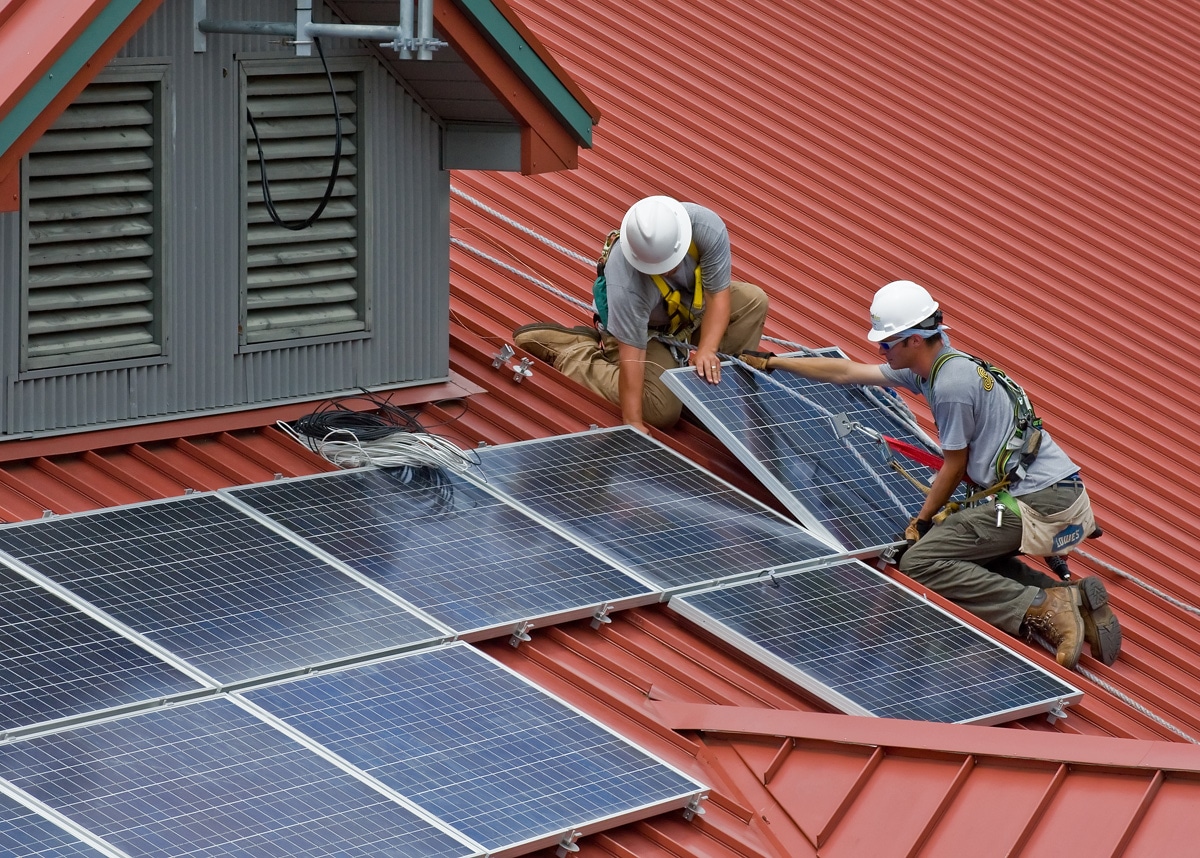Less than a week ago Amber Rudd was basking in the glory of the Paris Agreement. Today, she’s betraying all her high-flown rhetoric as she smashes up what’s left of the UK solar industry with a deep cuts in incentives to solar generators and the imposition of 20% VAT, writes Oliver Tickell of The Ecologist.
The government today concluded its attack on the UK‘s solar sector with amassive 64% cut in support for domestic scale solar power up to a 10kW capacity.
The cut is not quite so serious as set out in a consultation this summer, whichproposed an 87% cut. But it’s still plenty deep anough to devastate the UK‘s solar industry.
Under the new feed-in tariff (FIT) generators will receive just 4.39p per kWh generated compared to 12p today, plus the price they are paid by their electricity supplier for exported power (currently about 3.4p).
So the combined return on power returned to the grid by solar generators is about 8p – about half what the electricity company will sell it for to the house next door.
In additional move to keep the development of renewables within tight bounds, quarterly limits are to be imposed on the permissible volume of renewables build, defined separately for each technology and each scale band.
Say One Thing, Do The Opposite
The moves follow numerous bullish statements on climate change from both the prime minister David Cameron and Amber Rudd, the energy secretary, who came close to claiming personal credit for negotiating the Paris Agreement.
“The Paris agreement truly marks an historic turning-point”, she told MPs this week.”Nearly every country of the world has committed to take the global action needed to solve a global problem. Of course, it was hard fought and of course it required compromise to bring everyone with us.
“Now we have to set about implementing the commitments made … All parties have recognised that economic and global security requires us to tackle climate change. All have come together to commit to a single goal-net zero carbon emissions by the end of the century. All have agreed to set out plans to curb emissions and to be held accountable for their actions.”
In another attack on solar power last week, the government announced that it would levy the full 20% rate of VAT on solar PV installations, currently charged at 5% – adding about £900 to the cost of a typical system.
A Massive Blow to Jobs and Tackling Climate Change
Friends of the Earth renewable energy campaigner Alasdair Cameron was quick to show up the gap between Rudd’s rhetoric and her actions: “Less than a week after the UK Government agreed in Paris to keep global temperatures well below two degrees, the government has shown its true colours – and they’re certainly not green”, he said.
“These huge, misguided cuts to UK solar are a massive blow for jobs and the economy, and further undermine the government’s already tarnished credibility on tackling climate change. Massive public opposition to the government’s original proposal may have forced ministers to modify their plans, but this is still terrible news for the UK and its small-scale renewables industry.
He also attacked the government’s vast subsidies to fossil fuels, estimated by the International Monetary Fund at £26 billion per year, about 1.4% of GDP. According to the Department for Energy and Climate Change the cost of supporting all renewable energy technologies in 2014 to 2015 will total £3.5 billion.
“It’s outrageous that the government continues to hand out billions of pounds in subsidies every year to climate-wrecking fossil fuels, while trying to block the clean energy sources we urgently need to power our homes, hospitals and schools”, said Cameron.
“The good news is that the global renewable revolution is unstoppable, and the technology is advancing far faster than government thinking. But that will be scant comfort to the thousands of people whose jobs are under threat as a result of this short-sighted decision.”
Commercial Solar Out in the Cold
In a simultaneous move, the government also announced today the end of support for larger scale solar generation under the Renewables Obligation (RO) scheme from 1st April 2016. The largest solar power schemes of over 5MW in capacity were already excludedfrom the RO last year.
Modest commercial rooftop schemes up to 50kW – the size of a school or small commercial building – will also have to absorb a big cut in their FIT to 4.59p per kWh, slightly higher than that paid to domestic generators.
But the rate will fall sharply for larger schemes. Those up to 250kW will get 2.7p per kWh, up to 1000kW 2.27p, and above that threshold just 0.87p. The effect will be simple – to make medium and large scale solar installations commercially unviable.
“Government has partially listened. It’s not what we needed, but it’s better than the original proposals, and we will continue to push for a better deal for what will inevitably be a more consolidated industry with fewer companies”, said Paul Barwell, CEO of the Solar Trade Association.
“However, in a world that has just committed to strengthened climate action in Paris and which sees solar as the future, the UK Government needs to get behind the British solar industry. Allocating only around 1% of its clean power budget to new solar is too little, particularly when solar is now so cost-effective.
Poor ambition for solar risks missing out on not only our renewable energy targets in the UK, but on the world’s greatest economic opportunity too. The industry will certainly try its hardest but we will be pressing Government to do much more to boost solar power.”
Jan-Willem Bode, chief executive of solar installer Mongoose Energy, added: “By preparing us for the worst possible scenario and then climbing down slightly, it feels like they’re trying to make bad news look good.”
Photo: Wayne National Forest via Flickr
Subscribe to our newsletter
Stay up to date with DeSmog news and alerts






